No More Mr Nice Guy Book Summary: Transform from People Pleaser to Confident Man
A Proven Plan for Getting What You Want in Love, Sex, and Life
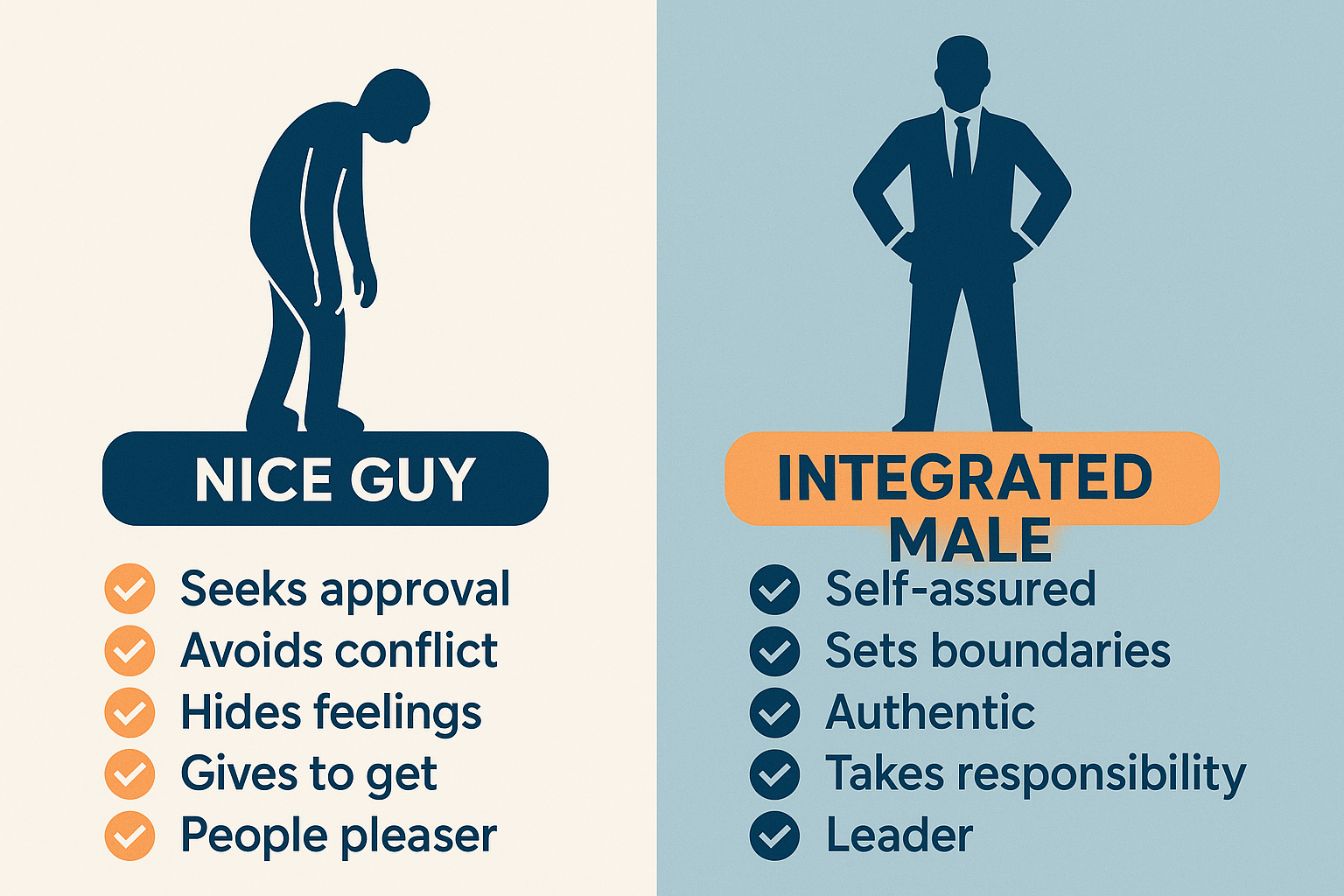
Life gets busy. Has No More Mr Nice Guy been sitting on your reading list? Learn the key insights now.
We’re just scratching the surface here. If you don’t have Dr. Robert Glover’s No More Mr Nice Guy book on masculine psychology and relationships, order the book or get the audiobook for free on Amazon to learn the juicy details.
About the No More Mr Nice Guy Book
No More Mr Nice Guy by Dr. Robert Glover has helped over one million men worldwide. This groundbreaking book teaches men how to stop people-pleasing and start living authentically. The No More Mr Nice Guy summary shows you how to build better relationships and gain real confidence.
Key No More Mr Nice Guy Book Details:
- Author: Dr. Robert A. Glover
- Published: 2000
- Genre: Self-help, Psychology, Relationships
- Pages: 192
- Available in print, audiobook, and digital formats
Introduction: Why Being Too Nice Hurts You
Are you tired of being overlooked even though you’re always nice? Do you constantly seek approval but feel resentful inside? You’re not alone. Millions of men have what No More Mr Nice Guy calls “Nice Guy Syndrome.” This means they try so hard to please everyone that they push away love, respect, and happiness.
The No More Mr Nice Guy book isn’t about becoming mean. It’s about becoming authentic. Dr. Glover calls this becoming an “integrated male.” This means being confident, real, and attractive to others. The transformation takes time, just like building any new habit in Atomic Habits.
Since 2000, No More Mr Nice Guy has helped over a million men change their lives. It’s been translated into many languages. Thousands of men have left positive reviews about how this book transformed their relationships and careers.
If you struggle in relationships, feel stuck at work, or always put others first, this No More Mr Nice Guy summary will help. Let’s learn why being “too nice” might hurt your happiness and what you can do about it.
About Dr. Robert Glover – Author of No More Mr Nice Guy
Dr. Robert Glover, author of No More Mr Nice Guy, is a licensed therapist with over 30 years of experience. He helps men overcome Nice Guy Syndrome. His work on the No More Mr Nice Guy book has been featured in major publications and radio shows. He’s a leading expert on male psychology and relationships.
Dr. Glover’s expertise in writing No More Mr Nice Guy comes from both training and personal experience. He has worked with thousands of men in therapy, groups, and seminars. His approach mixes traditional therapy with practical strategies men can use right away. This is similar to The 7 Habits of Highly Effective People.
Beyond therapy, Dr. Glover is a speaker and coach. He has helped men from all backgrounds – CEOs to blue-collar workers – using principles from No More Mr Nice Guy. They all learned to build better relationships using his methods. He continues teaching workshops and refining his approach based on real results.
Dr. Glover’s No More Mr Nice Guy work shows that real masculinity isn’t about being aggressive. It’s about being authentic, having integrity, and being brave enough to be yourself.
StoryShot #1: Understanding Nice Guy Syndrome
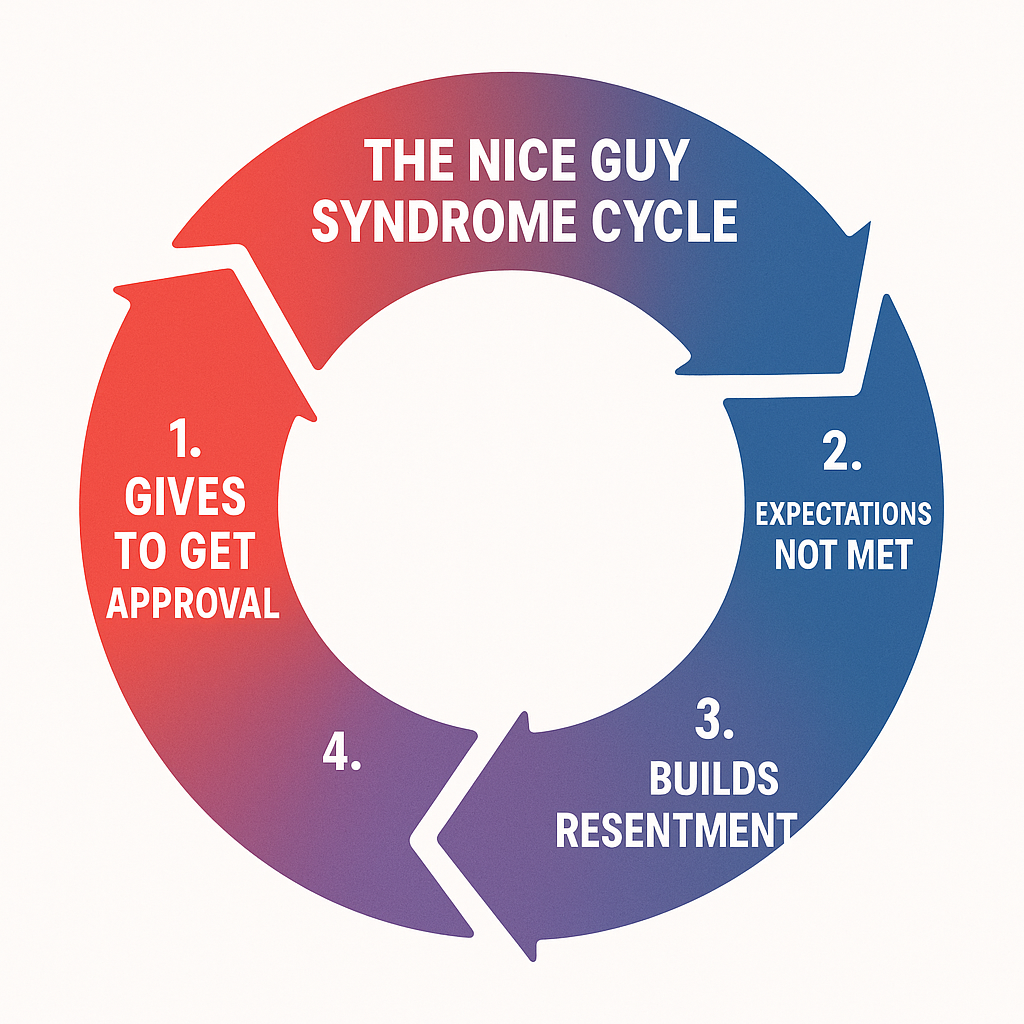
No More Mr Nice Guy is based on “covert contracts.” These are secret deals Nice Guys make in their heads: “If I’m good enough, helpful enough, or selfless enough, then I’ll get what I want.” The problem? The other person never agreed to this deal.
According to No More Mr Nice Guy, Nice Guys make dangerous assumptions that hurt their relationships:
They think being “nice” equals being good. But real niceness comes from genuine care, not manipulation. When you’re nice to get something back, you’re not being nice. You’re being sneaky. This is different from the authentic approach in How to Win Friends and Influence People.
They think all conflict is bad. This leads to bottled-up anger and passive-aggressive behavior. Healthy relationships need honest communication, including disagreement. This is explored in Crucial Conversations.
They put others first, hoping for payback. This creates imbalance. The Nice Guy gets angry when others don’t read their minds or return favors.
The No More Mr Nice Guy cycle works like this: Nice Guys give endlessly, expecting thanks and rewards. When they don’t get them, they build resentment. Eventually, this anger explodes through sarcasm, withdrawal, or emotional outbursts.
Think about it: Have you ever done something nice and felt angry when it wasn’t acknowledged? That’s Nice Guy Syndrome in action. You’re not being nice – you’re making a business deal where the other person doesn’t know the terms.
This pattern destroys closeness. When you’re always performing for approval, you never let others see the real you. As No More Mr Nice Guy notes: “It is actually a person’s rough edges and human imperfections that give others something to connect with.”
To break this cycle, you must realize your worth doesn’t depend on others’ approval. Learn to give without expecting anything back. Better yet, ask directly for what you need instead of hoping others will guess.
StoryShot #2: Childhood Roots of Nice Guy Behavior
Most Nice Guys learned these patterns as children to survive, according to No More Mr Nice Guy. When kids feel unsafe or unloved for being themselves, they adapt by becoming who they think others want. This is similar to attachment patterns in Attached.
No More Mr Nice Guy identifies childhood experiences that create Nice Guy Syndrome:
Emotional or physical abandonment teaches children their real selves are unlovable. They learn to hide true feelings and needs to avoid more rejection.
Conditional love from parents who only showed affection when the child was “good” creates adults who think love must be earned through perfect behavior.
Absent fathers mean boys miss seeing healthy masculinity. They often turn to mothers or other women for guidance on being a man. This can create confusion about authentic masculine behavior.
Perfectionist families where mistakes were severely punished create adults terrified of errors or showing weakness. This is also explored in The Gifts of Imperfection.
These experiences create what No More Mr Nice Guy calls “toxic shame” – the deep belief that you’re fundamentally flawed or unworthy of love. This shame drives the Nice Guy to constantly prove their worth through people-pleasing.
The good news? These patterns can be changed. Understanding where they come from is the first step to healing. Many Nice Guys feel relief when they realize their struggles aren’t character flaws but learned behaviors from difficult circumstances.
Recovery often means grieving the childhood you didn’t have. It means learning to meet your own needs instead of hoping others will do it. It’s about developing a secure sense of self that doesn’t depend on outside validation.
StoryShot #3: Stop Seeking Approval and Validate Yourself
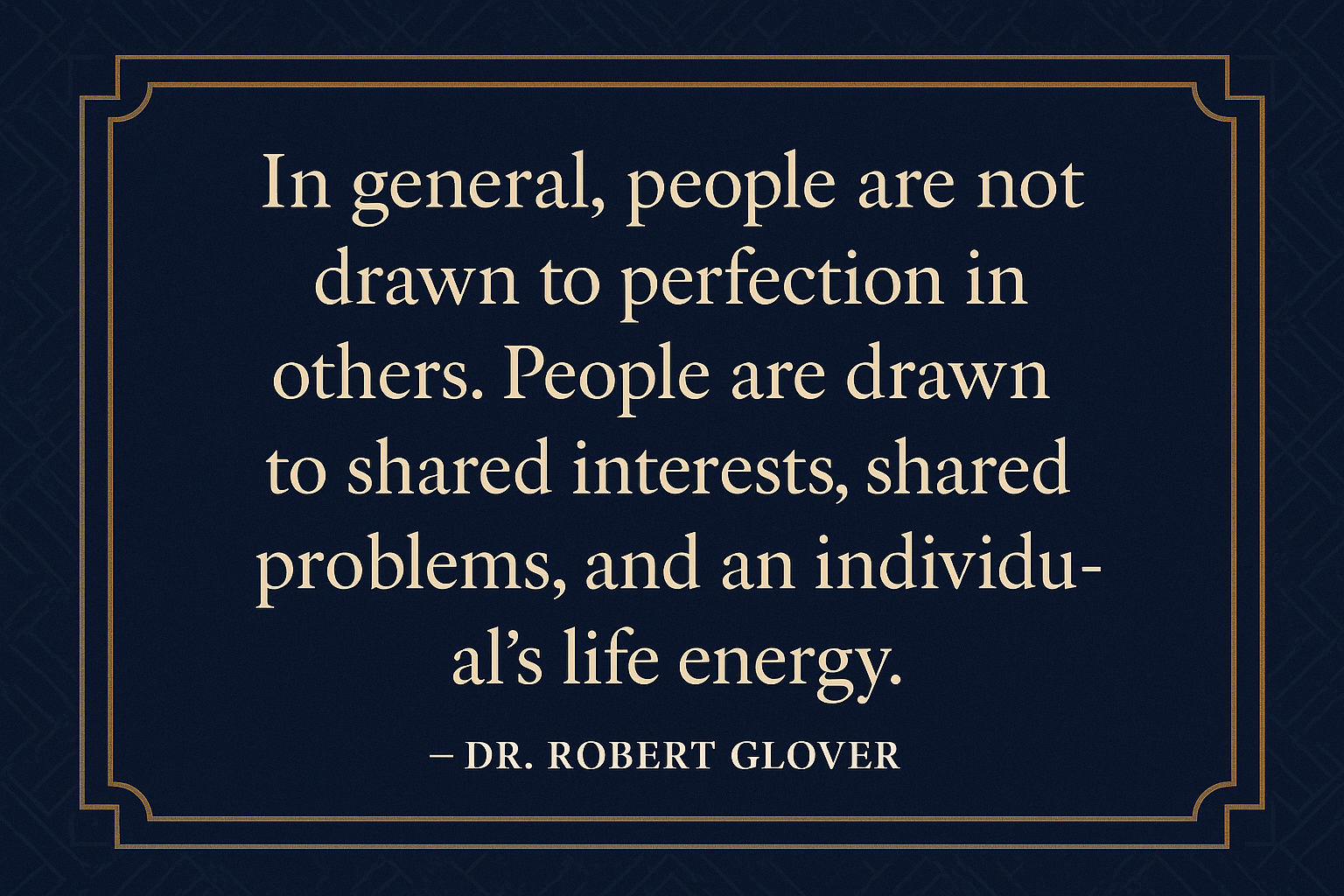
Recovery in No More Mr Nice Guy starts by shifting from seeking approval to giving it to yourself. This requires developing “self-approval” – the ability to validate your own worth regardless of others’ opinions.
Identify your approval-seeking behaviors. The No More Mr Nice Guy approach means noticing how much time and energy you spend trying to get others to like you. Do you change opinions based on your audience? Do you avoid expressing preferences to keep others happy? Do you constantly worry what others think?
Practice self-care as self-approval. Taking care of your physical, emotional, and spiritual needs sends a message that you matter. This includes eating well, exercising, getting enough sleep, and pursuing hobbies you enjoy.
Learn to sit with discomfort. Nice Guys often rush to fix situations or people to avoid uncomfortable feelings. Practice allowing yourself to feel disappointed, angry, or sad without immediately trying to change the situation. This skill is central to Emotional Intelligence.
Develop internal validation. Instead of looking to others for confirmation you’re okay, learn to recognize your own worth. Keep a journal of accomplishments, strengths, and positive qualities. Celebrate wins, no matter how small.
Set boundaries with people who take advantage. Nice Guys often attract people who use their giving nature. Learning to say no and set limits teaches others how to treat you while building self-respect.
This isn’t about becoming selfish. It’s about developing a healthy relationship with yourself so you can have healthier relationships with others. When you approve of yourself, you’re not desperately seeking validation from others. This makes you more attractive and authentic.
Remember: people are drawn to confidence and authenticity, not perfection. When you stop trying to be what you think others want and start being who you are, you’ll attract people who genuinely like you.
What’s one area where you’ve been seeking approval instead of trusting your judgment? Share your thoughts in the comments or tag us on social media!
StoryShot #4: Make Your Needs a Priority
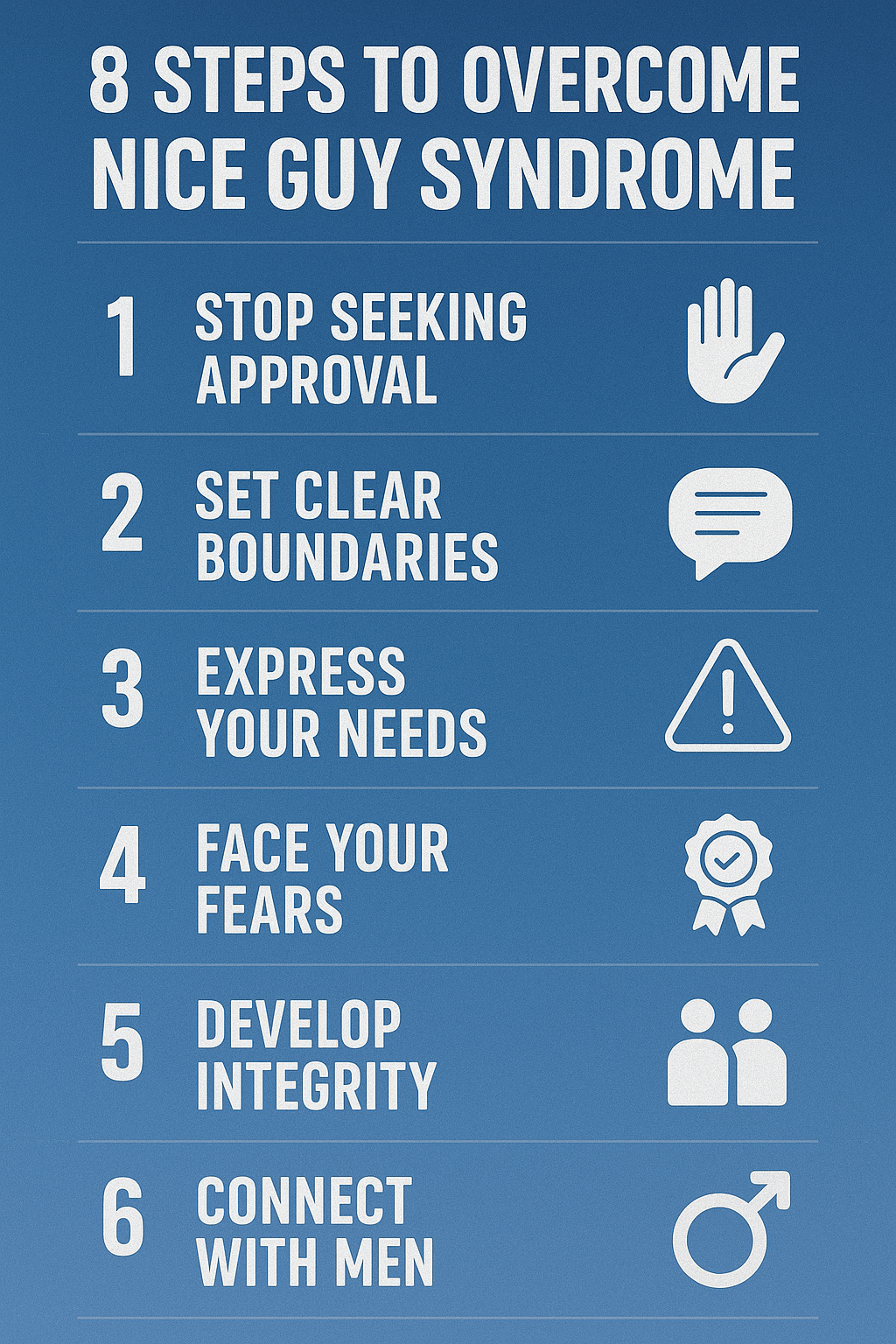
No More Mr Nice Guy explains that Nice Guys often think having needs is selfish. They’ve been taught to put everyone else first, leaving their own needs unmet. This creates resentment and emotional exhaustion.
Recognize that having needs is human. Everyone has physical, emotional, and spiritual needs. Denying yours doesn’t make you noble – it makes you dishonest and eventually bitter.
Learn the difference between caretaking and caring. No More Mr Nice Guy defines caretaking as doing for others what they should do themselves, often to feel needed or gain approval. Caring is supporting others in meeting their own needs. Caretaking creates dependency; caring creates empowerment.
Practice asking directly for what you want. Instead of hoping others will guess your needs, learn to communicate them clearly. This feels uncomfortable at first but is much more honest and effective than dropping hints. This approach is emphasized in Nonviolent Communication.
Stop keeping score of your good deeds. Many Nice Guys mentally track their acts of kindness, expecting payback. This turns generosity into a transaction and sets you up for disappointment when others don’t keep score the same way.
Develop emotional intelligence. Learn to identify and express feelings rather than stuffing them down. Emotions provide important information about your needs and boundaries.
The goal isn’t to become selfish but to achieve balance. When you meet your own needs, you have more to give others from abundance rather than emptiness. This creates healthier relationships where both people’s needs matter.
Think of airplane safety instructions: put on your own oxygen mask before helping others. You can’t effectively help anyone if you’re suffocating yourself.
StoryShot #5: Reclaim Your Personal Power
Personal power isn’t about controlling others – it’s about controlling yourself and your responses, according to No More Mr Nice Guy. Nice Guys often feel powerless because they’ve given away their power for approval or to avoid conflict.
No More Mr Nice Guy emphasizes that true personal power comes through surrender: “Surrender doesn’t mean giving up, it means letting go of what one can’t change and changing what one can.” This approach distinguishes healthy masculinity from toxic dominance.
Understand that boundaries are essential. Boundaries aren’t walls to keep others out. They’re guidelines that teach people how to treat you. They protect your time, energy, and emotional well-being.
Start small with boundary setting. If you’re not used to setting boundaries, start with low-stakes situations. Practice saying no to small requests before tackling bigger issues.
Expect pushback when you start setting boundaries. People used to taking advantage of your Nice Guy tendencies won’t like the change. Their resistance doesn’t mean you’re wrong – it means your boundaries are working.
Learn to handle conflict constructively. Conflict isn’t something to avoid at all costs. It’s a natural part of relationships that, when handled well, can lead to greater intimacy and understanding.
Stop trying to control outcomes. Focus on what you can control – your actions, words, and responses – rather than trying to control how others react.
Harvard Business Review research shows that people with clear boundaries are more respected and less likely to experience burnout.
Use the “Second Date Rule.” No More Mr Nice Guy suggests asking yourself: “If this behavior had happened on our second date, would there have been a third?” This helps you identify when you’re tolerating unacceptable behavior.
StoryShot #6: Express Your Emotions Healthily
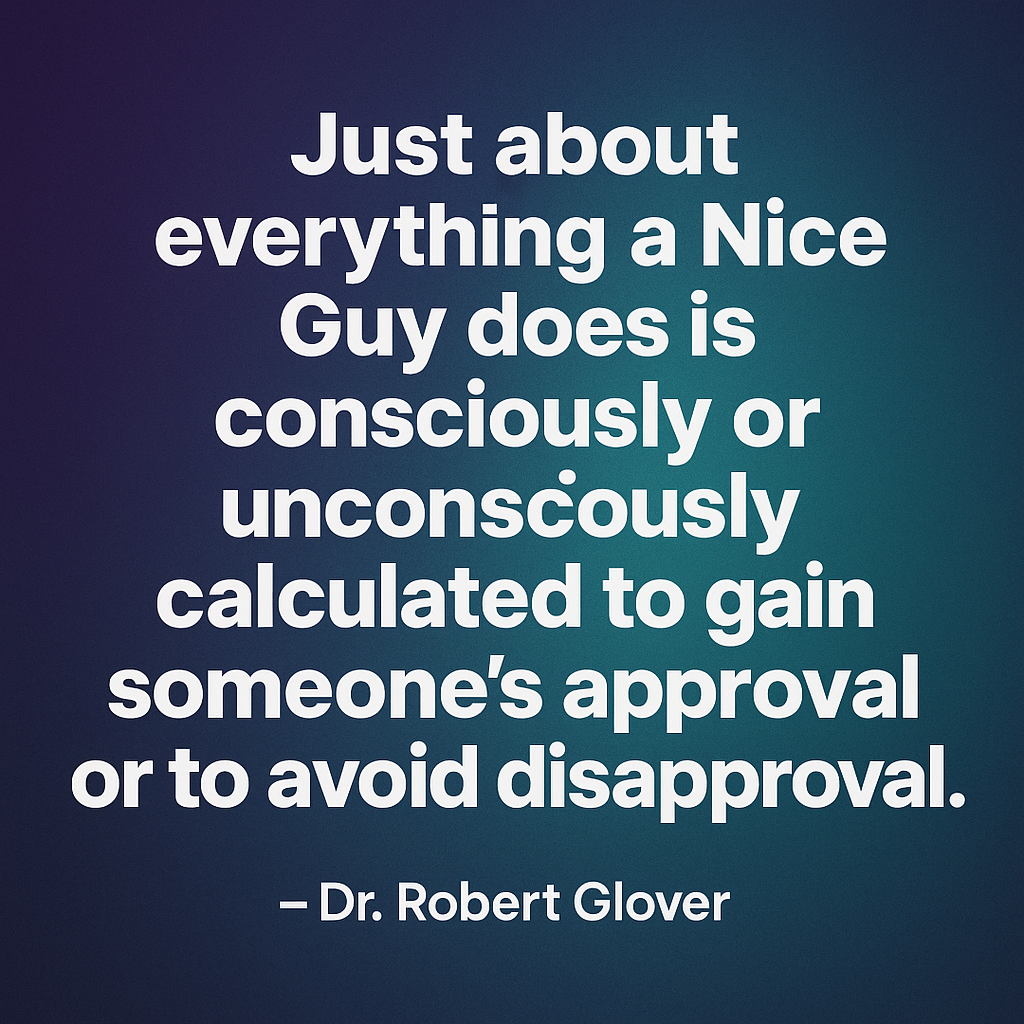
No More Mr Nice Guy explains that Nice Guys often suppress emotions, thinking that expressing feelings is weak. This emotional suppression creates internal pressure that eventually explodes in unhealthy ways. Learning emotional expression is crucial for authentic relationships, as discussed in Daring Greatly.
Recognize that emotions are information. Your feelings tell you important things about your needs, boundaries, and values. Ignoring them is like ignoring warning lights on your car’s dashboard.
Learn to identify and name emotions. Many Nice Guys can only identify two emotions: “fine” and “angry.” Develop a richer emotional vocabulary by learning to recognize feelings like disappointment, frustration, excitement, or contentment.
Practice expressing feelings in real-time. Instead of bottling up emotions and exploding later, learn to express them as they arise. This takes practice but leads to more authentic relationships.
Stop using emotions to manipulate. Some Nice Guys express emotions not to communicate but to get others to change their behavior. True emotional expression is about sharing your internal experience, not controlling others.
Find healthy outlets for difficult emotions. Whether it’s exercise, journaling, talking to a friend, or creative expression, find ways to process emotions constructively.
The key is learning to express emotions without blaming others or making them responsible for fixing your feelings. You might say, “I feel disappointed when plans change at the last minute” instead of “You always ruin everything.”
StoryShot #7: Build Male Connections
Many Nice Guys struggle with male friendships and feel more comfortable with women, according to No More Mr Nice Guy. While cross-gender friendships are valuable, men also need strong connections with other men to develop healthy masculinity. This need is explored in Way of the Superior Man.
Seek out male mentors and role models. Whether it’s a coach, therapist, or older male friend, find men who show the kind of masculinity you want to develop.
Join male-focused groups or activities. This could be a men’s group, sports team, hobby club, or volunteer organization. The goal is to practice being yourself around other men without the pressure of impressing women.
Learn from other men’s experiences. Listen to how other men handle relationships, career challenges, and personal growth. You’ll often find you’re not alone in your struggles.
Practice healthy competition. Many Nice Guys avoid competition because they’re afraid of winning or losing. Healthy competition can build confidence and teach valuable lessons about resilience.
Stop seeking validation from women about your masculinity. While women’s opinions matter, they shouldn’t be the primary source of validation for your worth as a man.
The goal isn’t to exclude women or become stereotypically masculine. It’s about developing a secure sense of your own masculinity that isn’t dependent on female approval.
StoryShot #8: Transform Your Relationship Approach
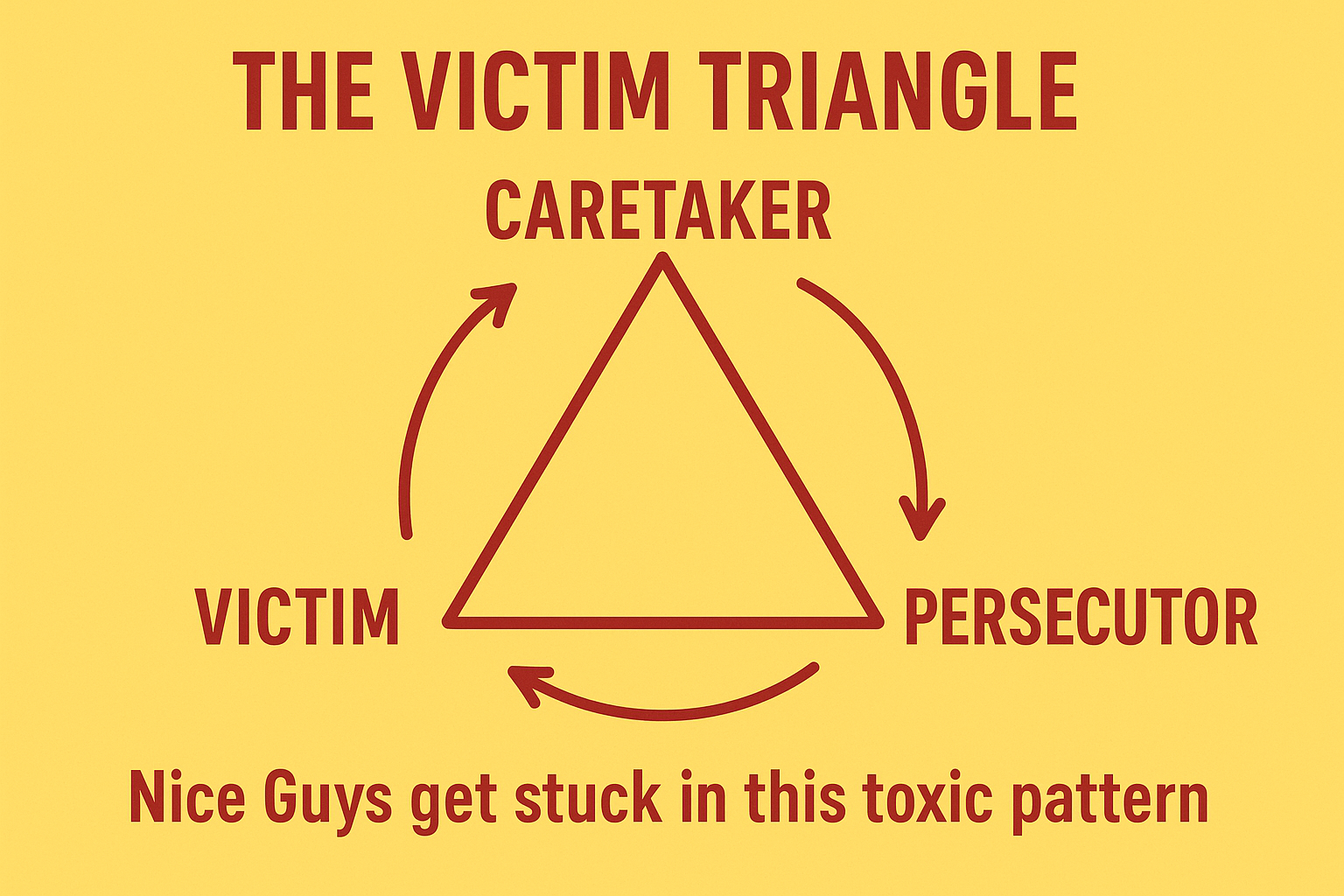
No More Mr Nice Guy shows that Nice Guys often struggle in romantic relationships because they approach dating from scarcity and people-pleasing rather than abundance and authenticity. This dynamic is explored in Models by Mark Manson.
One destructive pattern from No More Mr Nice Guy is the “Victim Triangle” – cycling between Caretaker, Victim, and Persecutor roles. Understanding this cycle is crucial for breaking free from toxic relationship patterns.
Stop trying to be the “perfect” boyfriend. Women aren’t attracted to perfect men – they’re attracted to authentic, confident men with their own lives and interests.
Avoid “fixer-upper” relationships. Nice Guys often choose partners with obvious problems, thinking they can rescue or change them. This rarely works and often enables unhealthy behavior.
Be direct about your intentions. Instead of pretending to be just friends while hoping for more, be honest about your romantic interest. This saves everyone time and prevents resentment.
Don’t use sex as validation. Many Nice Guys equate sexual acceptance with personal worth. This puts enormous pressure on sexual relationships and can lead to desperation.
Practice abundance thinking. Instead of clinging to any relationship out of fear of being alone, develop confidence that you can attract multiple potential partners.
Learn to handle rejection gracefully. Rejection isn’t a judgment of your worth – it’s simply incompatibility. The sooner you learn this, the less you’ll take dating personally.
For deeper insights into dating psychology, check out Psychology Today’s relationship section for research-backed advice on building healthy romantic connections.
StoryShot #9: Develop Integrity and Authenticity
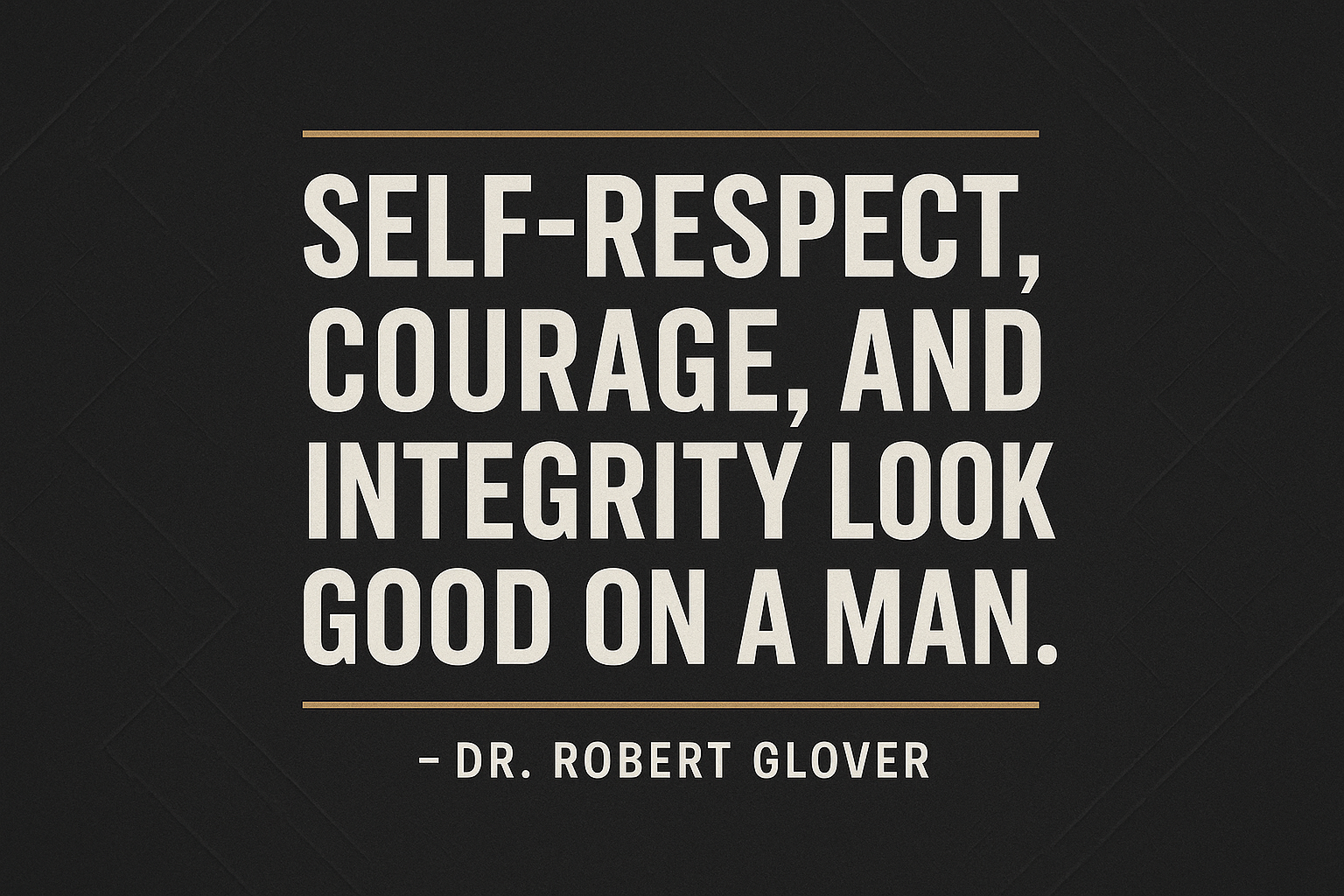
Integrity means aligning your actions with your values, even when it’s difficult, according to No More Mr Nice Guy. Nice Guys often compromise their integrity to avoid conflict or gain approval, which destroys their self-respect.
No More Mr Nice Guy defines integrity simply: “My definition of integrity is ‘deciding what feels right and doing it.'” This straightforward approach gets to the heart of authentic living.
Identify your core values. What principles are most important to you? What kind of person do you want to be? These values should guide your decisions, not others’ opinions. This process is similar to Man’s Search for Meaning.
Practice telling the truth. This includes being honest about your feelings, opinions, and needs. Start with small truths and work your way up to bigger ones.
Keep commitments to yourself. If you say you’re going to exercise, do it. If you promise yourself you’ll pursue a hobby, follow through. Building trust with yourself is as important as building trust with others.
Stop people-pleasing at the expense of your values. Sometimes being authentic means disappointing others. This is part of being a mature adult.
Admit when you’re wrong. Integrity includes taking responsibility for your mistakes rather than making excuses or blaming others.
The goal is to become someone you can respect and admire. When you live with integrity, you develop genuine self-confidence that doesn’t depend on others’ approval.
StoryShot #10: Create a Life You Love
No More Mr Nice Guy shows that Nice Guys often live reactive lives, focusing so much on pleasing others that they never develop their own dreams and goals. Recovery involves creating a life that genuinely excites you, as explored in Designing Your Life.
Identify your passions and interests. What activities make you lose track of time? What dreams have you put on hold? Start pursuing these things, even if others don’t understand or approve.
Set personal goals that challenge you. Whether it’s learning a new skill, starting a business, or traveling somewhere new, pursue goals that help you grow. This approach is similar to Grit.
Stop waiting for permission. You don’t need anyone’s approval to pursue your dreams. Start taking action on the things that matter to you.
Develop a sense of purpose. What impact do you want to have on the world? How can you contribute something meaningful? Having a purpose larger than yourself provides direction and fulfillment, as discussed in Drive.
Practice saying no to things that don’t align with your goals. Every yes to something unimportant is a no to something that matters to you.
Remember: the goal isn’t to become selfish but to become genuine. When you’re living authentically and pursuing your own dreams, you become more interesting and attractive to others.
No More Mr Nice Guy Books: Complete Collection
While No More Mr Nice Guy is Dr. Glover’s flagship work, readers often ask about other no more mr nice guy books in his collection. The original No More Mr Nice Guy remains the definitive guide, but Glover has also created:
- Companion workbooks and journals for No More Mr Nice Guy
- Follow-up materials for advanced recovery based on the principles
- Group therapy guides for facilitators using No More Mr Nice Guy concepts
- Online courses expanding on the core teachings
This groundbreaking work has spawned an entire movement of men’s self-improvement literature, but the original No More Mr Nice Guy by Robert Glover remains the essential starting point.
Implementation Guide to No More Mr Nice Guy Book
Today (5-minute action): Write down three ways you’ve been seeking approval this week. Notice these patterns without judgment – awareness is the first step to change.
This week (15-minute action): Practice setting one small boundary. This could be saying no to a request, expressing a preference, or asking for what you need directly.
Ongoing practice: Start each day by asking yourself: “What do I need today?” and “How can I honor those needs?” This builds the habit of self-awareness and self-care.
Top Quotes from No More Mr Nice Guy
Here are the most highlighted quotes from the No More Mr Nice Guy book:
“In general, people are not drawn to perfection in others. People are drawn to shared interests, shared problems, and an individual’s life energy.”
“Just about everything a Nice Guy does is consciously or unconsciously calculated to gain someone’s approval or to avoid disapproval.”
“Self-respect, courage, and integrity look good on a man.”
Which of these insights from No More Mr Nice Guy resonates most with you? Have you experienced Nice Guy Syndrome? Share your thoughts in the comments below!
Final Summary
No More Mr Nice Guy offers a clear path for men stuck in people-pleasing patterns. Dr. Glover’s message is simple: real masculinity isn’t about being “nice” or “perfect” – it’s about being genuine, setting boundaries, and taking responsibility for your own happiness.
Key insights from No More Mr Nice Guy include:
- Nice Guy Syndrome comes from childhood experiences that teach men to hide their real selves
- Seeking approval creates cycles of resentment and passive-aggressive behavior
- Recovery involves self-approval, boundaries, and honest emotional expression
- Healthy masculinity requires male connections and courage to face conflict
- Real relationships are built on honesty and mutual respect, not people-pleasing
The No More Mr Nice Guy book’s strength is its practical approach. Dr. Glover doesn’t just identify problems – he provides specific strategies men can use immediately. Real-life examples help readers recognize their own patterns and feel less alone.
Some readers may find the No More Mr Nice Guy focus on masculinity dated. The work mainly addresses heterosexual relationships and may not resonate with all experiences. While the book provides excellent starting points, some men may need additional therapy for deeper issues.
Rating
We rate No More Mr Nice Guy 4.5/5 stars. The book provides valuable insights and practical tools for men struggling with people-pleasing. While some concepts may feel dated, the core message about authenticity and self-respect remains highly relevant. Dr. Glover’s compassionate approach helps readers understand their struggles come from learned behaviors, not character flaws.
How would you rate Robert Glover’s book?
No More Mr Nice Guy PDF, Free Audiobook, and Animated Summary
Comment below or share to show you care.
New to StoryShots? Get our free top-ranking app to access the PDF, audiobook and animated versions of this No More Mr Nice Guy summary and hundreds of other bestselling nonfiction books. It’s been featured by Apple, The Guardian, The UN, and Google as one of the world’s best reading and learning apps.
This was the tip of the iceberg. To dive into the details and support Dr. Robert Glover, order theNo More Mr Nice Guybook here or get the audiobook for free.
Related StoryShots:
- Models by Mark Manson – Learn how authentic attraction works by focusing on honesty and vulnerability instead of pickup tricks and manipulation.
- The 5 Love Languages by Gary Chapman – Discover how to express love in ways your partner actually understands and feels appreciated.
- The Way of the Superior Man by David Deida – Master the art of masculine purpose and learn how to create passionate relationships through spiritual masculinity.
- Get The Guy by Matthew Hussey – Build confidence and learn practical dating strategies that help you attract and keep the right person.
- Why Men Love Bitches by Sherry Argov – Understand why men are attracted to women who maintain their independence and don’t become doormats.
- Modern Romance by Aziz Ansari and Eric Klinenberg – Navigate today’s dating world with research-backed insights on online dating, texting, and modern relationship challenges.
- The Art of Seduction by Robert Greene – Learn the psychology behind attraction and influence through historical examples and strategic relationship building.
- Men Are from Mars Women Are from Venus by John Gray – Bridge communication gaps between men and women by understanding fundamental differences in how we think and express emotions.
This comprehensive summary provides the essential insights from Dr. Robert Glover’s No More Mr Nice Guy work on Nice Guy Syndrome. For the complete experience and detailed exercises, we recommend reading the full book.













The summeries will be more attractive if you summarise the book chapter wise. Don’t summarise the book in one go, instead summarise the book in chapter. It will be more helpful.
Thanks for the feedback, Mahesh! The challenge with chapter by chapter summaries, in our experience, is that they can be much longer (and take 20-30 min to read). We also try to not “replace” reading the actual book. What are your thoughts on these?